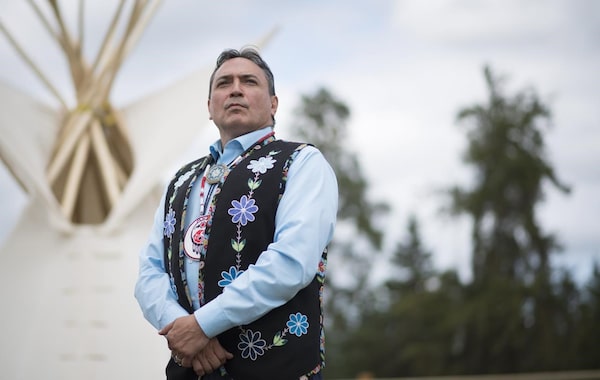
Assembly of First Nations National Chief Perry Bellegarde during a media availability during the Premiers and Indigenous Leaders meeting in Big River First Nation, Sask., on July, 9, 2019.The Canadian Press
Assembly of First Nations National Chief Perry Bellegarde is not seeking re-election in July and will instead spend the remainder of his term on advocacy, including trying to influence the next federal budget.
Mr. Bellegarde, who was elected to his position in late 2014 and again in 2018, will be officially informing chiefs of his decision this week in a speech to the AFN’s annual general assembly, he told The Globe and Mail in an exclusive interview.
“My term runs until July, 2021, and I want to give a lot of my energy, time and focus on the remaining six months we’ve got left in my term to get things done,” he said.
“If you are running for re-election, you have to do a campaign, you have to do a team. That takes a lot of energy to do that … it’s about really putting my energies in and not being distracted.”
The national chief of the AFN, an advocacy organization representing more than 900,000 First Nations people in 634 communities across the country, plays a key role in trying to shape federal government policy.
The organization holds an election for the position every three years and, with Mr. Bellegarde’s decision not to run, the AFN will have a new leader who will have to navigate a critical working relationship with the Prime Minister and cabinet.
During his tenure as national chief, Mr. Bellegarde, 58, has been credited, among other things, with creating a document, Closing the Gap, which was designed to influence federal political parties ahead of the 2015 election.
Mr. Bellegarde, from Little Black Bear First Nation in Saskatchewan, also said that much of his work as national chief has been about trying to educate Canadians so they better understand the need to close the divide between First Nations and non-First Nations people. Issues, such as the need for clean drinking water and access to education, are matters the entire country should care about, he said.
“If they’re addressed, it not only benefits First Nations people, it benefits Canada as a country,” he said, as he pointed to polling results by Nanos Research released this fall as evidence that a growing number of Canadians see First Nations issues as key priorities.
“Canadians are getting it.”
Mr. Bellegarde said laws, such as on Indigenous languages and child welfare, are examples of where he has influenced government legislation.
He has been engaged in outreach to encourage First Nations people to vote. During the 2015 election campaign, the AFN identified 51 influential ridings, including several in Western Canada, where First Nations voters could affect the electoral outcome.
The effort also led to some personal soul searching on Mr. Bellegarde’s part after he was asked by a reporter whether he voted. During a news conference, he acknowledged that he had not, but later released a statement to say he heard from First Nations elders, leaders, citizens and young people that he needed to set an example.
He has held a number of roles in leadership in his life, including as a chief and councillor for his community. He has also been the chief of the Federation of Saskatchewan Indian Nations and the AFN’s regional chief for Saskatchewan.
Mr. Bellegarde said his decision to step away from First Nations politics is a difficult one. He said he doesn’t know what is next in his career but that there will be much work ahead in the coming months to influence government policy and the 2021 federal budget.
One of his priorities, he says, is to push for the passage of legislation that would apply the principles of the foremost international commitment on the rights of Indigenous peoples to Canadian law.
The bill, tabled by Justice Minister David Lametti on Thursday, proposes to affirm that the terms of the UN Declaration on the Rights of Indigenous Peoples (UNDRIP) apply to federal laws, meaning they could be used to interpret existing laws and develop new legislation. It would not transform the declaration itself into law.
Mr. Bellegarde said that when he assumed the role of national chief in 2014, the previous Conservative government did not support UNDRIP.
“Things have changed; things have moved,” he said. “I always say, what an amazing opportunity for a young guy from Little Black Bear to have been part of that.”
Know what is happening in the halls of power with the day’s top political headlines and commentary as selected by Globe editors (subscribers only). Sign up today.